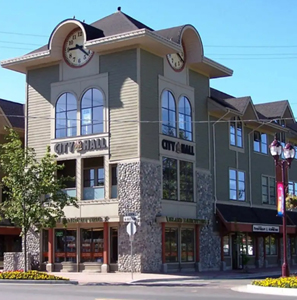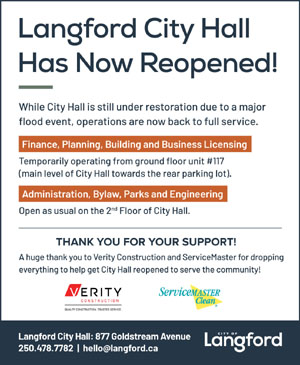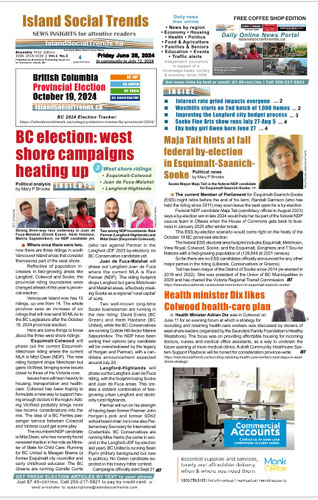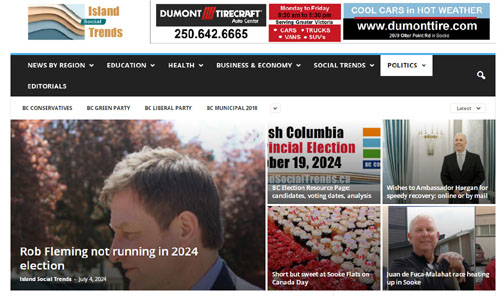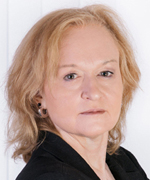Saturday July 6, 2024 | LANGFORD, BC
Opinion-Editorial by Gabe Haythornthwaite | As first published in Island Social Trends Print Edition June 28, 2024 (pg 3)
In the pantomime debate around city budgets, we have been bombarded by the tired talking point that economic prosperity requires ever lower property and business taxes. This simplistic prescription ignores the key problems of regressive taxation, restricted public input and limited city services.
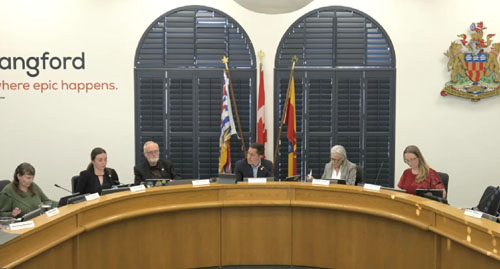
In Langford, right-wing cries of ruin have been hurled against the council’s 15.6% property tax increase, which amounts to less than a dollar a day for the average-priced property. The budget feature drawing the most fire is the council’s ending of tax breaks for property owners siphoned from the city’s amenity fund; a practice that has serially shortchanged public infrastructure development.
The manufactured outrage around tax increases — which are dwarfed by the costs of corporate banking interest rate hikes and retail price gouging — has cloaked the critical question about who pays what in city budgets. Provincial rules mandate regressive local taxation, i.e. the same rates for big corporate businesses and higher-value properties as small businesses and modest homes. Despite a symbolic stand against regressive taxation by Langford council — in the form of a motion to the Association of Vancouver Island and Coastal Communities, a regional municipal lobby — the likelihood of any further change on this appears remote.
Those wanting to remedy Langford financial planning problems would do well to examine the budget process itself. As in all local governments, current city decision-making is led by unelected administrators who direct the information used by council in its formal deliberations.
Although this council introduced public input in the last two annual budgets, the final decisions matched closely with initial administration recommendations.
The past council had a finance committee which met infrequently but did have members from outside of city hall. While the current Langford Community Advisory Committee lists city finances as one of its mandates, this year’s budget was not brought to the committee at any point.
The poor political theatre around the Langford budget has also obscured the most salient question of all; what the operational budget is actually spent on. Langford is unique as a 30-year experiment in privatized city services. On this topic, it is long overdue to pose two critical questions: first, how much do corporate interests benefit from city taxes in this regard; and, second, how well do residents fare from this arrangement with the services they receive?
Democratic approaches to city budgeting are needed to address key local problems. First, for better decision-making, a finance committee with community representation should be established to monitor and plan city finances with the inclusion of meaningful public input during the annual budget process.
Further, an active alliance with other local governments could actively challenge the province with community support to tax large corporations and landed estates at a progressively higher rate than small businesses and ordinary homeowners.
Lastly, a democratic city calls for universal public services. Langford should begin this process through a comprehensive services review, comparing service costs and levels with other municipal jurisdictions, to assess the service value Langford taxpayers are getting from privatized, for-profit contracts.
===== EDITOR’s NOTE:
The new City of Langford council (elected October 2022) is almost entirely composed of mayor and councillors who are new to politics. Only one councillor has carried over from the previous 30-year way of doing things. They have grappled with a number of budget and management issues that were in various ways previously either overlooked or deliberately avoided. ~ Mary P Brooke, Editor
Mary P Brooke has written, edited and published news about politics since 2008. She was the founder of three print publications that have now been permanently archived at the Sooke Region Museum: MapleLine Magazine (2008-2010), Sooke Voice News (2011-2013), and West Shore Voice News (2014-2020).
Ms Brooke launched Island Social Trends online at IslandSocialTrends.ca in 2020. The biweekly print edition of Island Social Trends is available free in community (coffee shops, rec centres, libraries) and by paid Premium Digital Subscription (as PDF by email).
Opinion-editorials and letters may be submitted for consideration to: letters@islandsocialtrends.com
==== ABOUT THE OP-ED Contributor:
Gabe Haythornthwaite is a Langford resident who maintains a keen eye on the goings-on of City of Langford council and processes.
He is a guest editorial contributor to Island Social Trends.


